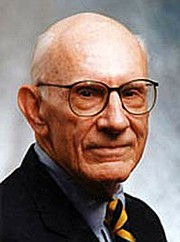Journalist Claude Sitton, 89, died last Tuesday in Atlanta, his place of birth. Between May 1958 and October 1964, Sitton covered the storied "Race Beat," which was the Jim Crow Era Deep South, for The New York Times. Sitton wrote almost 900 articles, including ones on his interactions with a racist sheriff and his deputies, his first-hand experiences on one of the buses that carried the Freedom Riders from Montgomery, Ala. to Jackson, and the all-night riots that ensued after the University of Mississippi admitted James Meredith.
Sitton was born December 4, 1925, to Pauline and Claude Sitton. He joined the United States Navy after graduating from high school in 1943. In the Navy, he served on a landing ship in the battles for the Philippines in World War II and received an honorable discharge after the war ended in 1945. He then enrolled at Oxford College of Emory University in Oxford, Ga., and after a year there, transferred to Emory University in Atlanta. He graduated in 1949 with a bachelor's degree in journalism.
He began his career as journalist with the International News Service and United Press followed by two years in Ghana as a press attache for the United States Information Agency. In 1957, The New York Times hired Sitton as copy editor. The next year Turner Catledge, then the managing editor of The Times, sent him to cover the struggle for civil rights in the American South.
In the Pulitzer Prize winning book, "The Race Beat: The Press, the Civil Rights Struggle, and the Awakening Nation" (Vintage, 2007, $17), Gene Roberts and Hank Klibanoff wrote, "The civil rights story needed a reporter who knew the region well, had the right accent, abided by all the rules, wouldn't get emotionally involved, wouldn't argue with anyone, wouldn't become the news, who would just write what he saw, wouldn't get beat, wouldn't get snookered, and was willing to give up his family, perhaps his life, for the story."
Sitton's unwavering practice of finding the character in the story set, as Roberts and Klibanoff wrote, "a level of reporting that would establish the national stand for two decades." In an interview, Klibanoff told The Associated Press that his dogged approach to beat coverage showed the power of "finding a good story and getting to it first."



Comments
Use the comment form below to begin a discussion about this content.